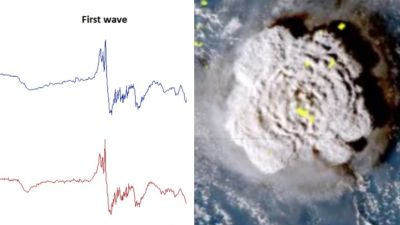Hunga Tonga volcano eruption causes air pressure waves being detected 10,000 miles away in the UK

Tonga's huge volcanic eruption has caused changes to air pressure waves across the UK, the Met Office says.
Meterologists have detected the waves in areas including Essex, Norfolk and Suffolk as the Hunga Tonga volcano's might is being felt in weather effects reaching across the planet.
The Met Office has confirmed a 'ripple' effect as the eruption sent air pressure rising across the eastern coastline, following Saturday's massive undersea volcanic eruption.
The tsunami threat around the Pacific has begun to recede, while the extent of the damage to Tonga remains unclear.
Satellite images showed the spectacular eruption that took place on Saturday evening, with a plume of ash, steam and gas rising like a mushroom above the blue Pacific waters.
The Met Office has detected several air pressure waves across many parts of the UK following the eruption, it said.
The national forecaster told ITV News Anglia it had detected no further evidence of pressure changes in the UK since the last wave passed over the UK in the early hours of Sunday morning.
The Met Office explained the pressure pattern is erratic between the main waves.
It added in a tweet: "Our atmosphere acts as a fluid, like dropping a pebble in a still pond and seeing the ripples. "A UK pressure trace for the past 24 hours shows how our atmosphere continues to see those ripples since the first pressure wave from the Tonga eruption arrived on Saturday evening."
Weatherquest meterologist Dan Holley wrote a series of tweets explaining that the air pressure wave caused by the eruption was being detected in the east of England.
He shared charts showing the pressure wave being detected across East Anglia, including Norfolk and Essex, as well as in Suffolk, further south along the coastline.
He wrote: "The pressure wave from the Hunga Tonga volcanic eruption, having travelled a distance of ~16,500 km (10,200 miles), has been detected across East Anglia this evening on home weather stations - around 14½ hours after the eruption."
The eruption sent waves surging across the Pacific, with the effects felt as far away as New Zealand.
Prime Minister Jacinda Ardern said earlier that there had not yet been any official reports of injuries or deaths in Tonga, but cautioned that authorities had not yet made contact with some coastal areas and smaller islands.
“Communication with Tonga remains very limited. And I know that is causing a huge amount of anxiety for the Tongan community here,” the NZ leader said.